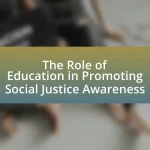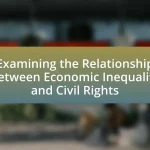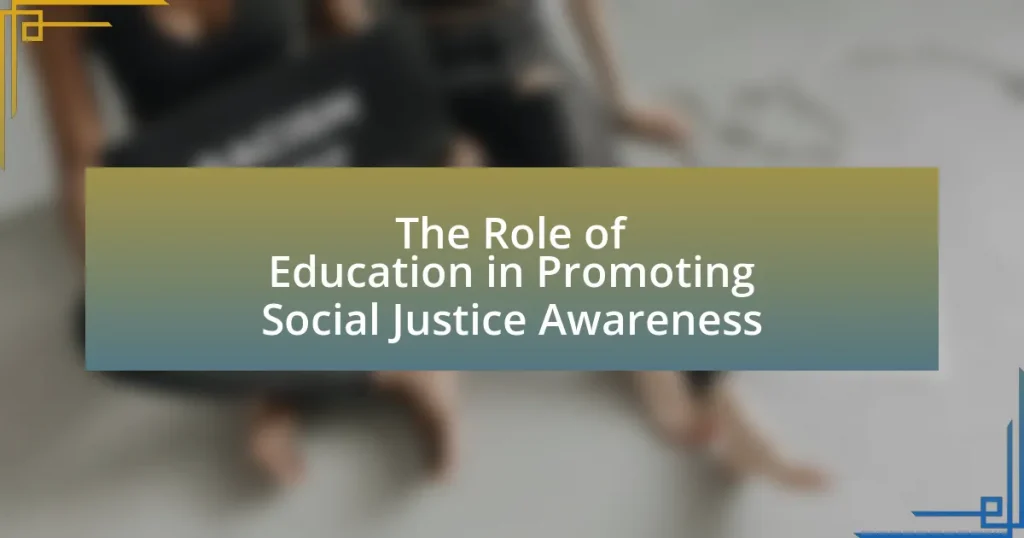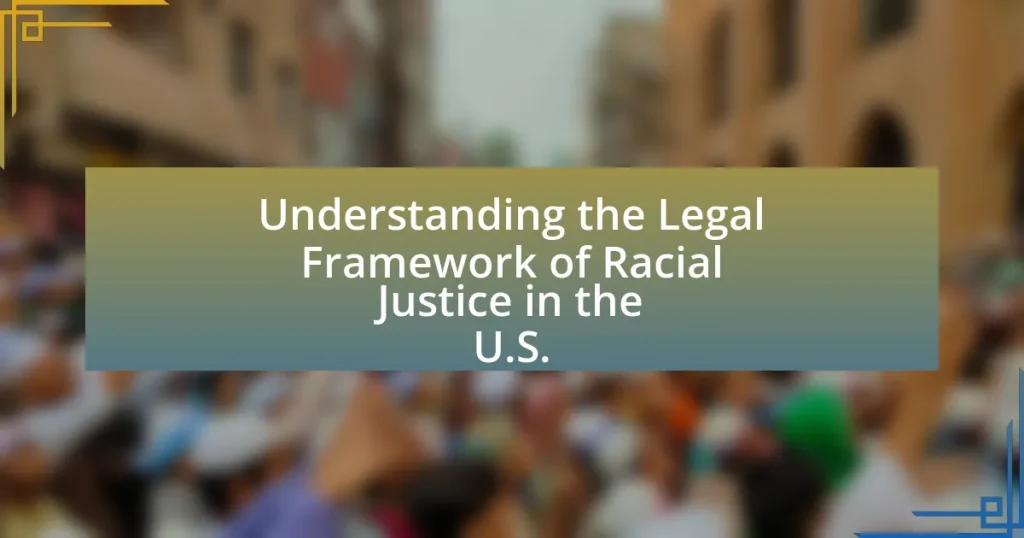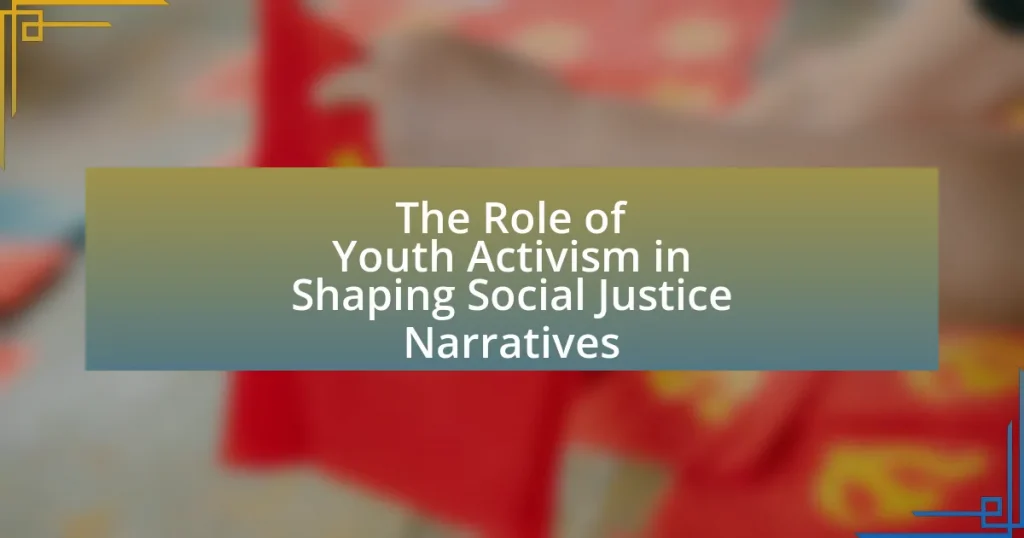The article examines the critical role of education in promoting social justice awareness, emphasizing how educational institutions can equip individuals with the knowledge and skills to understand and challenge systemic inequalities. It discusses the importance of integrating diverse perspectives into curricula, fostering empathy, and encouraging civic engagement among students. Key principles of social justice in education, such as equity, access, and participation, are outlined, along with the challenges faced by educators in implementing social justice initiatives. The article also highlights effective teaching methods, community partnerships, and the significance of student voice in creating inclusive educational environments that advocate for social justice.
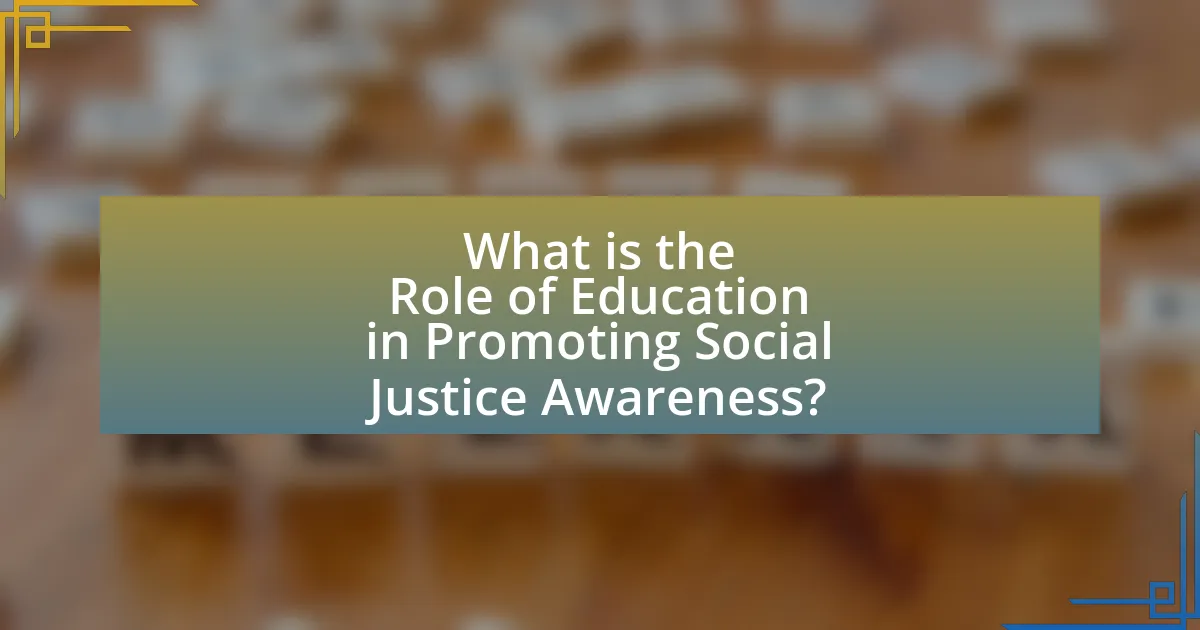
What is the Role of Education in Promoting Social Justice Awareness?
Education plays a crucial role in promoting social justice awareness by equipping individuals with the knowledge and critical thinking skills necessary to understand and challenge systemic inequalities. Through curricula that include diverse perspectives and historical contexts, education fosters empathy and encourages students to engage with social issues actively. For instance, studies show that students exposed to social justice education are more likely to participate in civic activities and advocate for marginalized communities, as evidenced by research conducted by the National Education Association, which highlights the positive correlation between social justice curricula and student activism.
How does education contribute to social justice awareness?
Education contributes to social justice awareness by equipping individuals with critical thinking skills and knowledge about societal inequalities. Through curricula that include diverse perspectives and historical contexts, education fosters an understanding of systemic injustices, such as racism, sexism, and economic disparity. For instance, studies show that students exposed to social justice education are more likely to engage in civic activities and advocate for equitable policies. Research by the Southern Poverty Law Center indicates that teaching about social justice issues can lead to increased empathy and activism among students, demonstrating the direct impact of education on fostering awareness and action towards social justice.
What are the key principles of social justice in education?
The key principles of social justice in education include equity, access, participation, and rights. Equity ensures that all students receive fair treatment and opportunities tailored to their individual needs, addressing systemic inequalities. Access emphasizes the importance of providing all students, regardless of their background, with the necessary resources and support to succeed academically. Participation involves engaging students, families, and communities in the educational process, fostering a sense of belonging and shared responsibility. Rights highlight the fundamental entitlements of every student to a quality education, free from discrimination and bias. These principles are supported by research indicating that equitable educational practices lead to improved outcomes for marginalized groups, as demonstrated in studies by the National Education Association and the American Educational Research Association.
How can educational institutions foster a culture of social justice?
Educational institutions can foster a culture of social justice by integrating social justice education into their curricula and promoting inclusive practices. This approach involves teaching students about systemic inequalities, encouraging critical thinking, and facilitating discussions on diversity and equity. Research indicates that schools that implement social justice curricula see increased student engagement and awareness of social issues, as evidenced by a study published in the “Journal of Educational Psychology,” which found that students exposed to social justice themes demonstrated higher levels of empathy and civic engagement. Additionally, institutions can create supportive environments by establishing policies that promote equity, providing training for educators on culturally responsive teaching, and actively involving students in community service projects that address social justice issues.
Why is social justice awareness important in education?
Social justice awareness is important in education because it fosters an inclusive environment that promotes equity and understanding among diverse student populations. By integrating social justice principles into educational curricula, schools can address systemic inequalities and empower students to critically analyze societal issues. Research indicates that educational settings that prioritize social justice awareness lead to improved student engagement and academic performance, as students feel valued and understood. For instance, a study by the American Educational Research Association found that students exposed to social justice education are more likely to develop critical thinking skills and a sense of agency in their communities.
What impact does social justice awareness have on students?
Social justice awareness significantly enhances students’ critical thinking and empathy. When students engage with social justice issues, they develop a deeper understanding of societal inequalities and the importance of equity. Research indicates that educational programs focused on social justice lead to increased civic engagement; for instance, a study by the American Educational Research Association found that students exposed to social justice curricula are more likely to participate in community service and advocacy efforts. This awareness fosters a sense of responsibility and motivates students to challenge injustices, ultimately contributing to a more informed and active citizenry.
How does social justice awareness influence community engagement?
Social justice awareness significantly enhances community engagement by fostering a sense of responsibility and collective action among individuals. When community members are educated about social justice issues, they are more likely to recognize inequalities and injustices within their environment, prompting them to participate in initiatives aimed at addressing these challenges. Research indicates that communities with higher levels of social justice awareness often see increased volunteerism and participation in local governance, as individuals feel empowered to advocate for change. For instance, a study by the National Conference on Citizenship found that communities engaged in social justice education reported a 20% increase in civic participation compared to those without such initiatives. This correlation underscores the vital role that social justice awareness plays in mobilizing individuals towards active community involvement.
What challenges does education face in promoting social justice awareness?
Education faces significant challenges in promoting social justice awareness, primarily due to systemic inequalities, lack of resources, and resistance to change. Systemic inequalities in education manifest through disparities in funding, access to quality teachers, and curriculum representation, which hinder equitable learning environments. For instance, schools in low-income areas often receive less funding, resulting in fewer educational resources and opportunities for students. Additionally, educators may lack the training or support necessary to effectively teach social justice concepts, limiting their ability to engage students in critical discussions. Resistance to change can also arise from cultural and political factors, where stakeholders may oppose the inclusion of social justice topics in curricula due to differing beliefs or fear of controversy. These challenges collectively impede the ability of educational institutions to foster a comprehensive understanding of social justice among students.
What barriers exist within educational systems that hinder social justice?
Barriers within educational systems that hinder social justice include systemic inequities, inadequate funding, and biased curricula. Systemic inequities manifest in the form of disparities in resources and opportunities based on socioeconomic status, race, and geographic location, which can lead to unequal educational outcomes. Inadequate funding often results in overcrowded classrooms, lack of access to technology, and insufficient support services, disproportionately affecting marginalized communities. Additionally, biased curricula that fail to represent diverse perspectives can perpetuate stereotypes and limit students’ understanding of social justice issues. Research by the National Center for Education Statistics indicates that schools in low-income areas receive significantly less funding than those in affluent neighborhoods, further entrenching these barriers.
How can educators overcome these challenges?
Educators can overcome challenges in promoting social justice awareness by implementing inclusive curricula that reflect diverse perspectives and experiences. This approach fosters an environment where all students feel represented and valued, which is essential for effective learning. Research indicates that inclusive education improves student engagement and academic performance, as seen in a study by the National Education Association, which found that schools with diverse curricula report higher levels of student satisfaction and achievement. Additionally, professional development programs focused on cultural competency equip educators with the skills necessary to address social justice issues effectively, further enhancing their ability to create an equitable learning environment.
How can education systems effectively promote social justice awareness?
Education systems can effectively promote social justice awareness by integrating social justice curricula that address issues of equity, diversity, and inclusion. Research indicates that when educational institutions incorporate discussions on systemic inequalities and empower students to engage in social activism, they foster critical thinking and empathy. For example, a study by the American Educational Research Association found that students exposed to social justice education demonstrated increased awareness of social issues and a commitment to civic engagement. By implementing training for educators on culturally responsive teaching and creating safe spaces for dialogue, education systems can further enhance students’ understanding of social justice concepts and their implications in society.
What teaching methods are most effective for promoting social justice?
Collaborative learning methods are most effective for promoting social justice. These methods encourage students to engage in dialogue, share diverse perspectives, and work together to solve real-world problems related to social justice issues. Research indicates that collaborative learning fosters critical thinking and empathy, essential components for understanding and addressing social inequalities. For instance, a study by Johnson and Johnson (2014) highlights that cooperative learning strategies significantly enhance students’ awareness of social justice topics and their ability to advocate for change.
How can curricula be designed to include social justice themes?
Curricula can be designed to include social justice themes by integrating diverse perspectives, critical thinking, and real-world applications into the educational framework. This approach involves incorporating materials that reflect the histories and contributions of marginalized groups, fostering discussions around equity, and encouraging students to analyze societal structures. Research indicates that when curricula include social justice themes, students demonstrate increased engagement and a deeper understanding of social issues, as evidenced by studies showing improved critical thinking skills and civic participation among students exposed to such content.
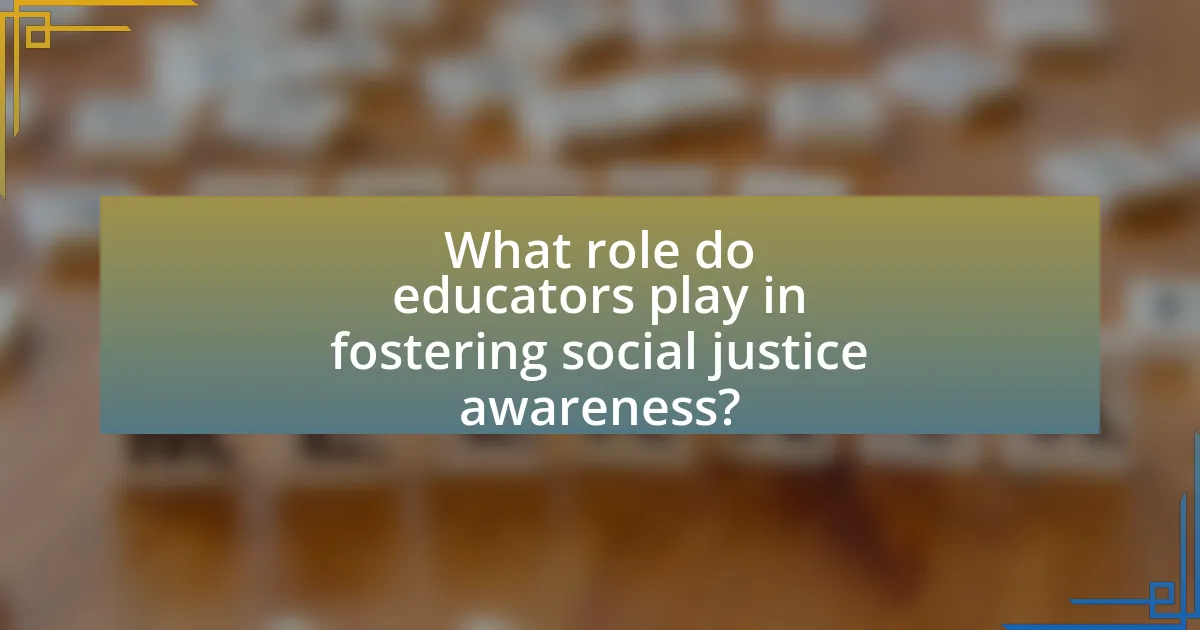
What role do educators play in fostering social justice awareness?
Educators play a crucial role in fostering social justice awareness by integrating social justice principles into their curricula and teaching practices. They create inclusive learning environments that encourage critical thinking about societal issues, such as inequality and discrimination. Research indicates that when educators incorporate discussions on social justice, students develop a greater understanding of diverse perspectives and the importance of equity. For instance, a study by the American Educational Research Association found that students exposed to social justice education are more likely to engage in civic activities and advocate for social change. This demonstrates that educators not only impart knowledge but also empower students to become active participants in promoting social justice.
How can teachers integrate social justice into their classrooms?
Teachers can integrate social justice into their classrooms by incorporating diverse perspectives in the curriculum and fostering critical discussions about equity and justice. This approach encourages students to engage with real-world issues, such as systemic inequality and discrimination, through literature, history, and current events. Research indicates that when students learn about social justice topics, they develop a greater sense of empathy and civic responsibility, which is essential for fostering an inclusive society. For instance, a study by the National Education Association highlights that teaching social justice can improve student engagement and academic performance, as it connects learning to students’ lived experiences.
What resources are available for educators to teach social justice?
Educators can access a variety of resources to teach social justice, including curriculum guides, online platforms, and community organizations. For example, Teaching Tolerance provides comprehensive lesson plans and resources focused on social justice themes, while the Zinn Education Project offers materials that promote a more inclusive history curriculum. Additionally, organizations like the Southern Poverty Law Center offer training and resources to help educators address issues of equity and justice in their classrooms. These resources are designed to equip educators with the tools necessary to foster critical thinking and awareness around social justice issues among students.
How can teachers assess students’ understanding of social justice concepts?
Teachers can assess students’ understanding of social justice concepts through a variety of methods, including formative assessments, discussions, and project-based learning. Formative assessments, such as quizzes and reflective journals, allow teachers to gauge students’ grasp of key concepts in real-time. Discussions in class can provide insights into students’ critical thinking and ability to articulate their understanding of social justice issues. Project-based learning, where students engage in community service or advocacy projects, enables teachers to evaluate students’ application of social justice concepts in practical contexts. Research indicates that these assessment methods not only measure understanding but also enhance students’ engagement with social justice topics, fostering a deeper awareness and commitment to social equity.
What professional development opportunities exist for educators?
Professional development opportunities for educators include workshops, online courses, mentorship programs, and conferences focused on social justice education. These opportunities enable educators to enhance their teaching practices, engage with current social justice issues, and collaborate with peers. For instance, organizations like the National Education Association offer resources and training specifically aimed at integrating social justice into curricula, which supports educators in fostering awareness and advocacy among students.
How can workshops enhance teachers’ ability to teach social justice?
Workshops can enhance teachers’ ability to teach social justice by providing them with practical strategies, resources, and a collaborative environment to discuss and reflect on social justice issues. These professional development opportunities equip educators with the knowledge to integrate social justice concepts into their curriculum effectively. Research indicates that teachers who participate in focused workshops demonstrate increased confidence and competence in addressing social justice topics, leading to more inclusive and equitable classroom practices. For instance, a study by the National Education Association found that teachers who engaged in social justice workshops reported a 30% increase in their ability to facilitate discussions on equity and diversity in their classrooms.
What role do mentorship programs play in supporting educators?
Mentorship programs play a crucial role in supporting educators by providing guidance, professional development, and emotional support. These programs facilitate the sharing of best practices and strategies, which enhances teaching effectiveness and fosters a collaborative learning environment. Research indicates that educators who participate in mentorship programs experience increased job satisfaction and improved retention rates, with studies showing that mentorship can reduce teacher turnover by up to 50%. Additionally, mentorship programs contribute to the professional growth of educators by helping them navigate challenges and develop leadership skills, ultimately leading to a more equitable educational landscape.
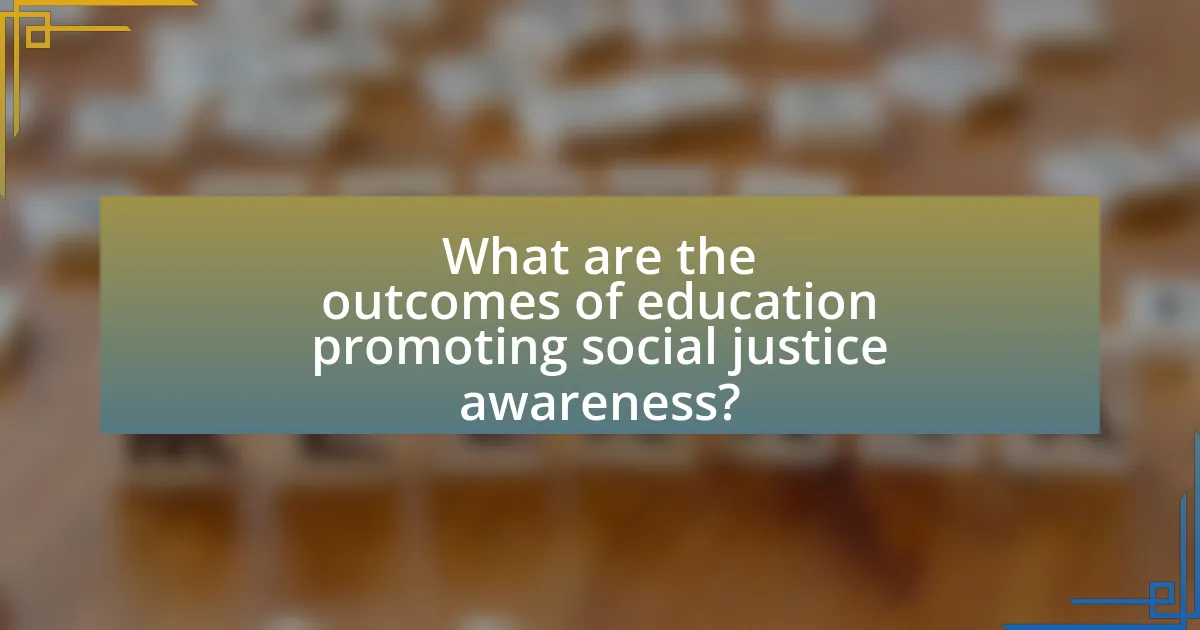
What are the outcomes of education promoting social justice awareness?
Education promoting social justice awareness leads to increased critical thinking and empathy among students. This outcome is evidenced by studies showing that curricula focused on social justice issues enhance students’ ability to analyze societal structures and recognize inequalities. For instance, research conducted by the American Educational Research Association indicates that students exposed to social justice education demonstrate higher levels of civic engagement and a commitment to social change. Additionally, such education fosters a more inclusive environment, reducing instances of discrimination and promoting respect for diversity, as highlighted in the findings of the National Education Association.
How does social justice education affect student behavior and attitudes?
Social justice education positively affects student behavior and attitudes by fostering empathy, critical thinking, and a sense of responsibility towards social issues. Research indicates that students exposed to social justice curricula demonstrate increased awareness of inequality and develop a commitment to social change. For instance, a study by Adams, Bell, and Griffin in “Teaching for Diversity and Social Justice” shows that such educational approaches lead to improved interpersonal relationships among students and a reduction in discriminatory behaviors. This evidence supports the conclusion that social justice education cultivates a more inclusive and proactive student body.
What evidence supports the positive impact of social justice education?
Social justice education positively impacts students by enhancing their critical thinking skills and fostering empathy. Research conducted by the American Educational Research Association indicates that students engaged in social justice curricula demonstrate increased awareness of social inequalities and improved civic engagement. Additionally, a study published in the Journal of Educational Psychology found that such education leads to higher levels of academic achievement and motivation among marginalized students, as it connects their personal experiences to broader societal issues. These findings collectively underscore the effectiveness of social justice education in promoting both individual growth and social responsibility.
How can social justice education lead to civic engagement among students?
Social justice education can lead to civic engagement among students by fostering critical thinking and awareness of societal issues. This educational approach encourages students to analyze power dynamics, understand systemic inequalities, and recognize their role in advocating for change. Research indicates that students exposed to social justice curricula are more likely to participate in community service and activism, as evidenced by a study conducted by the University of California, which found that 75% of students engaged in civic activities after completing a social justice course. This engagement stems from a deeper understanding of their rights and responsibilities as citizens, motivating them to take action in their communities.
What are best practices for implementing social justice education?
Best practices for implementing social justice education include integrating diverse perspectives into the curriculum, fostering critical thinking, and promoting active engagement in social issues. Integrating diverse perspectives ensures that students learn about various cultures, histories, and experiences, which is essential for understanding systemic inequalities. Research by the American Educational Research Association highlights that curricula reflecting diverse viewpoints enhance students’ empathy and awareness of social justice issues. Fostering critical thinking encourages students to analyze and question societal norms, empowering them to challenge injustices. Active engagement, such as community service or advocacy projects, allows students to apply their learning in real-world contexts, reinforcing the importance of social justice in their lives.
What strategies can schools adopt to create inclusive environments?
Schools can adopt strategies such as implementing differentiated instruction, fostering a culturally responsive curriculum, and promoting social-emotional learning to create inclusive environments. Differentiated instruction allows teachers to tailor their teaching methods to accommodate diverse learning styles and abilities, ensuring that all students can engage with the material effectively. A culturally responsive curriculum incorporates diverse perspectives and histories, which helps students from various backgrounds feel represented and valued in their education. Additionally, promoting social-emotional learning equips students with the skills to understand and manage their emotions, fostering a supportive community where all students can thrive. Research indicates that schools employing these strategies see improved academic outcomes and increased student engagement, highlighting their effectiveness in promoting inclusivity.
How can community partnerships enhance social justice education?
Community partnerships can enhance social justice education by providing real-world contexts and resources that enrich learning experiences. These collaborations allow educational institutions to connect with local organizations, activists, and community leaders, facilitating the integration of diverse perspectives and lived experiences into the curriculum. For instance, partnerships with organizations focused on civil rights can offer students firsthand insights into social justice issues, fostering critical thinking and empathy. Research indicates that students engaged in community-based learning demonstrate improved understanding of social justice concepts and increased civic engagement, as evidenced by studies conducted by the National Youth Leadership Council, which highlight the positive impact of service-learning on student outcomes.
What practical steps can educators take to promote social justice awareness?
Educators can promote social justice awareness by integrating social justice themes into the curriculum. This approach allows students to engage with real-world issues such as inequality, discrimination, and human rights. For instance, incorporating literature from diverse authors can provide multiple perspectives on social justice topics, fostering empathy and critical thinking. Research indicates that students exposed to diverse narratives are more likely to develop a nuanced understanding of social issues (Ladson-Billings, 1994, “The Dreamkeepers: Successful Teachers of African American Children”). Additionally, educators can facilitate discussions and projects that encourage students to analyze current events through a social justice lens, empowering them to become active participants in their communities.
How can educators create action plans for social justice initiatives?
Educators can create action plans for social justice initiatives by first identifying specific social justice issues relevant to their community and curriculum. This involves conducting needs assessments through surveys, discussions, and research to understand the challenges faced by marginalized groups. Following this, educators should set clear, measurable goals that address these issues, ensuring they align with educational standards and community values.
Next, they can develop strategies that include curriculum integration, community partnerships, and student-led projects to foster engagement and awareness. For instance, incorporating diverse perspectives in lesson plans can enhance students’ understanding of social justice. Additionally, establishing a timeline and assigning responsibilities will help in organizing the implementation of the action plan.
Finally, educators should evaluate the effectiveness of their initiatives through feedback and assessment tools, allowing for adjustments and improvements over time. Research indicates that schools implementing structured social justice curricula see increased student engagement and awareness, demonstrating the impact of well-planned action initiatives.
What role does student voice play in promoting social justice in education?
Student voice plays a crucial role in promoting social justice in education by empowering students to express their perspectives and advocate for equitable practices. When students actively participate in decision-making processes, they highlight issues of inequality and discrimination within the educational system, fostering a culture of inclusivity. Research indicates that schools that prioritize student voice see improved engagement and academic outcomes, as students feel valued and heard. For instance, a study by the National Education Association found that when students are involved in shaping policies, it leads to a more just and responsive educational environment, ultimately contributing to social justice.

